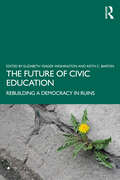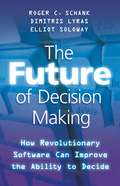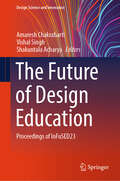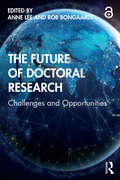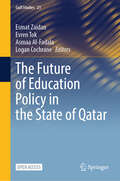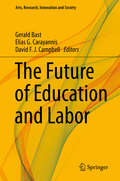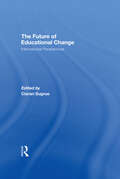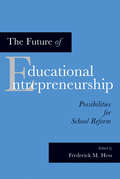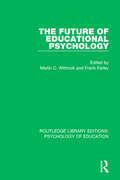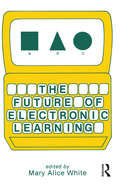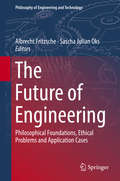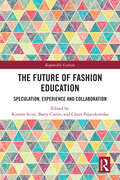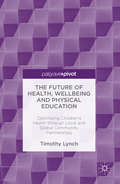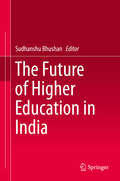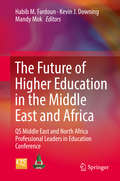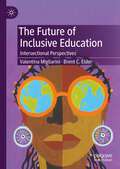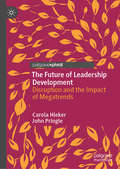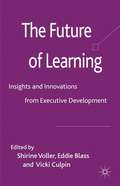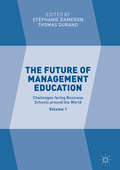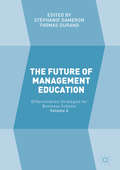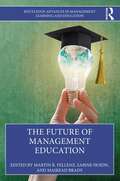- Table View
- List View
The Future of Civic Education: Rebuilding a Democracy in Ruins
by Keith C. Barton Elizabeth Yeager WashingtonSpeaking to the need to move beyond traditional formulations, this textbook presents radical visions for transforming civic education in the United States.Drawing on the experience of educators and scholars—including those rooted in feminist, queer, abolitionist, global, and race-conscious perspectives—this work offers new, practical ideas for civic education reform. Responding to recent political crises, many scholars, educators, and public commentators have called for a rebirth of civic education, but these all are grounded in the premise that the goal of civic education should be to teach students about the U.S. Constitutional system and how to operate within it. This book argues that the U.S. governmental system, including the Constitution, is infused with racist and anti-democratic premises and procedures. It asks: How can we seek a new path—one that is more democratic, more equitable, and more humane? A diverse range of leading civic educators, who are willing not just to push the boundaries of civic education but to operate outside its assumptions altogether, explore what future possibilities for civic education might look like and how these innovative ideas could be implemented in the classroom.Combining theory with practice, The Future of Civic Education will be important reading for those studying or researching in social studies methods, social studies issues, citizenship, and civic education. It will also be beneficial to social studies teachers at elementary and secondary levels, as well as policymakers and non-governmental organizations (NGOs).
The Future of Decision Making
by Roger C. Schank Dimitris Lyras Elliot SolowayWe now possess the capability to make great business decisions in even the most difficult situations with the use of today's advanced software capability. The authors, who are experts in the field, explain the new science of decision-making and offer examples and advice that will enable readers put it to use in their organizations.
The Future of Design Education: Proceedings of InFuSED23 (Design Science and Innovation)
by Amaresh Chakrabarti Vishal Singh Shakuntala AcharyaThis book showcases cutting-edge research contributions from the International Symposium on Future of Design Education (InFuSED23) – written by eminent researchers from across the world on the topic ‘Future of Design Education’. The world is witnessing phenomenal change in terms of digital connectivity, movement from villages to towns and to megacities, major demographic movement across socio-economic strata, the looming threat of climate change and unsustainable development, terrorism and regionalism, major geopolitical shifts in the world order, and others. The practice of design, the “interdisciplinary discipline” as described by Nigel Cross, will have to play a major role in addressing the consequences of these changes, which by their very nature are people-centric and interdisciplinary. Therefore, design education must play a central role in training young minds in their evolving contributions as generic, empathic problem solvers for the world. InFuSED23 is intended to bring together top design researchers, teachers and thought leaders from across the world to deliberate on the topic “the future of design education” in its multiple perspectives: the aspects of design in which to train designers and design researchers, the manner in which the training is to be imparted, the levels at which training must be carried out, and so on.
The Future of Doctoral Research: Challenges and Opportunities
by Anne Lee Rob BongaardtThis book explores the future of doctoral research and what it means to be involved in all stages of the process, providing international insights into what’s changing, why it’s changing and how to work best with these changes. It looks at the key issues that have been thrown into sharp relief by crises such as world pandemics. Drawing on work from outstanding authors, this book shows the ways in which the doctoral process has altered the supervisor/supervisee model and the challenges that now need to be managed, and demonstrates the importance of aligning all the stakeholders, systems and processes to ensure a successful future for doctoral education. Bringing together a range of perspectives, innovative practices and rigorous research, this book tackles topics such as: how doctoral research changes in keeping with the global expansion and transformation of doctoral education programmes the significant influence funding bodies – be they charities, governments, businesses or non-governmental agencies – can have on doctoral research the extent to which doctoral research penetrates daily life and vice versa how to encourage and embed an ethical approach to research, as well as university responses to external challenges. Uniquely international and bringing together the many stakeholders in the research business, this book is essential reading for all doctoral supervisors, candidates and anyone involved in designing or organising research programmes for early career researchers and doctoral students. Chapter 9 of this book is freely available as a downloadable Open Access PDF at http://www.taylorfrancis.com under a Creative Commons Attribution-Non Commercial-No Derivatives (CC-BY-NC-ND) 4.0 license.
The Future of Education Policy in the State of Qatar (Gulf Studies #21)
by Logan Cochrane Esmat Zaidan Evren Tok Asmaa Al-FadalaThis open access book provides a topical overview of education, development plans, the knowledge economy, and human development in the State of Qatar, focusing on socio-political and cultural challenges, from a policy perspective. It describes the ecosystem of education and its features, impacts, and the factors that facilitate or inhibit its current shape and development, including the pendulum of internationalization versus localization of education and indigenous knowledge. The book serves as an arena to engage vital discourse on the importance of early childhood education and inclusive education systems, particularly for those with diverse abilities. In view of the transformations occurring in the education systems in the Gulf Region over the past few decades, the book examines the advancement of education in Qatar and the critical political, economic, and cultural influences shaping education development plans, reforms, and policies. The book identifies the key factors and barriers that continue to hinder governmental initiatives in the region, in terms of the need to elevate the quality of key fields. The authors unpack the requirements imposed on policymakers in the broader Gulf region and pinpoint the need for Qatar to adopt more sustainable and state-of-the-art education policies, programs, and tools, to ameliorate the quality of education. In doing so, the book draws an all-inclusive portrayal of education in the country and its links to human and economic development. It identifies the transformations required to adapt to changing conditions, particularly within a dynamic and increasingly competitive job market. Bringing together academics and experts in public policy, education, development, and related social sciences in the Arabian Gulf, this book contributes to co-creating innovative and multidisciplinary solutions within higher education, relevant to both students and scholars in these respective fields.
The Future of Education and Labor (Arts, Research, Innovation and Society)
by Elias G. Carayannis David F. J. Campbell Gerald BastThis book explores the ways in which education impacts labor markets. Specifically, the contributions in this book indicate that the future of labor is creative, socially aware and inter-disciplinary while identifying the changes and innovations needed in our educational systems to meet this demand.Due to an increasing automatization (robotic manufacturing), the character of labor and work in general will change dramatically in the near future. This will be the case not only in the western countries, but also in the larger emerging economies in Asia, for example China and India. While societal environments, economy and the character of labor are increasingly in a process of dramatic changes, the educational systems and the leading principles of research about labor and employment are not changing adequately. Cross-disciplinary (inter-disciplinary and trans-disciplinary) thinking and learning is not the main focus of our educational systems. Consequently, the systems of academic research follow and apply disciplinary or even sub-disciplinary strategies, avoiding cross-disciplinary research approaches, and not supporting inter-disciplinary academic career models. This book introduces such strategic models to better prepare the next generation of workers for the new knowledge economy, and the future of democratic societies.
The Future of Educational Change: International Perspectives
by Ciaran SugrueThis timely book provides a systematic overview and critique of contemporary approaches to educational change from some of the best-known writers and scholars in the field, including Andy Hargreaves, Larry Cuban, Ivor Goodson, Jeannie Oakes, Milbrey McLaughlin, Judyth Sachs and Ann Liebermann. Divided into four sections, the book addresses the key themes: What has been the impact of educational change? How has the impact differed in different circumstances? What are the new directions for research on policy and practice? How can we link research, policy and practice? By highlighting critical lessons from the past, the book aims to set an agenda for policy-related research and the future trajectories of educational reforms, while also taking into account the dominant rhetorics of international ‘social movements’ and the ‘refracted’ nature of policy agenda at national and local levels. This book addresses issues which with many educators around the world are currently grappling. It will appeal to academics and researchers in the field, as well as providing an introduction to key issues and themes in Educational Change for graduates and practitioners.
The Future of Educational Entrepreneurship: Possibilities for School Reform
by Frederick M. HessThe Future of Educational Entrepreneurship examines the challenge of creating innovative and productive entrepreneurial activity in American education. In the course of exploring these challenges, the book considers a number of crucial issues and circumstances: existing "barriers to entry" that prohibit or obstruct entrepreneurial efforts; the availability--and frequent lack--of venture capital for fueling entrepreneurial activities; the effort to sponsor and create a sufficiently large population of talented educational entrepreneurs; and questions about research, development, and quality control in the burgeoning entrepreneurial sector. A field that is likely to grow in size and importance in the years to come, educational entrepreneurship receives much-needed attention, analysis, and elucidation in this lively, wide-ranging book.
The Future of Educational Entrepreneurship: Possibilities for School Reform
by Frederick M. HessThe Future of Educational Entrepreneurship examines the challenge of creating innovative and productive entrepreneurial activity in American education. In the course of exploring these challenges, the book considers a number of crucial issues and circumstances: existing &“barriers to entry&” that prohibit or obstruct entrepreneurial efforts; the availability—and frequent lack—of venture capital for fueling entrepreneurial activities; the effort to sponsor and create a sufficiently large population of talented educational entrepreneurs; and questions about research, development, and quality control in the burgeoning entrepreneurial sector. A field that is likely to grow in size and importance in the years to come, educational entrepreneurship receives much-needed attention, analysis, and elucidation in this lively, wide-ranging book.
The Future of Educational Psychology (Routledge Library Editions: Psychology of Education)
by Merlin C. Wittrock Frank FarleyOriginally published in 1989, this title for the first time in one volume, organized and discussed the fundamental advances in theory, technology, and research methods in educational psychology, at the time. The book provides comprehensive, integrated reviews and discussions of recent advances of the day in such areas as learning, cognition, instruction, and applications to curriculum.
The Future of Electronic Learning
by Mary Alice WhiteFirst Published in 1983. Routledge is an imprint of Taylor & Francis, an informa company.
The Future of Engineering: Philosophical Foundations, Ethical Problems and Application Cases (Philosophy of Engineering and Technology #31)
by Albrecht Fritzsche Sascha Julian OksIn a world permeated by digital technology, engineering is involved in every aspect of human life. Engineers address a wider range of design problems than ever before, raising new questions and challenges regarding their work, as boundaries between engineering, management, politics, education and art disappear in the face of comprehensive socio-technical systems. It is therefore necessary to review our understanding of engineering practice, expertise and responsibility.This book advances the idea that the future of engineering will not be driven by a static view of a closed discipline, but rather will result from a continuous dialogue between different stakeholders involved in the design and application of technical artefacts. Based on papers presented at the 2016 conference of the forum for Philosophy, Engineering and Technology (fPET) in Nuremberg, Germany, the book features contributions by philosophers, engineers and managers from academia and industry, who discuss current and upcoming issues in engineering from a wide variety of different perspectives. They cover topics such as problem solving strategies and value-sensitive design, experimentation and simulation, engineering knowledge and education, interdisciplinary collaboration, sustainability, risk and privacy.The different contributions in combination draw a comprehensive picture of efforts worldwide to come to terms with engineering, its foundations in philosophy, the ethical problems it causes, and its effect on the ongoing development of society.
The Future of English Teaching Worldwide: Celebrating 50 Years From the Dartmouth Conference (National Association for the Teaching of English (NATE))
by Andrew Goodwyn Cal Durrant Lisa Scherff Wayne Sawyer Don ZancanellaThe seminal Dartmouth Conference (1966) remains a remarkably influential moment in the history of English teaching. Bringing together leading voices in contemporary English education, this book celebrates the Conference and its legacy, drawing attention to what it has achieved, and the questions it has raised. Encompassing a multitude of reflections on the Dartmouth Conference, The Future of English Teaching Worldwide provides fresh and revisionist readings of the meeting and its leading figures. Chapters showcase innovative and exciting new insights for English scholars, and address both theoretical and practical elements of teaching English in a variety of settings and countries. Covering topics including the place of new media in English curricula, the role of the canon, poetry and grammar, the text is divided into three accessible parts: Historical perspectives Dartmouth today: why it still matters Reflections: but for the future. This powerful collection will be of value to researchers, postgraduate students, literature scholars, practitioners, teacher educators, trainee and in-service teachers, as well as other parties involved in the teaching and study of English.
The Future of English in Asia: Perspectives on language and literature (Routledge Studies in World Englishes)
by David Huddart Michael O'Sullivan Carmen LeeThis collection is unique in bringing together key thinkers on language and literature to discuss the future of English in Asia. Many of the contributors are themselves responsible for important sub-genres in English linguistics and literary studies and this collection gives them the opportunity to respond to each other directly. The different chapters also respond to different contemporary debates and emerging trends and discourses that are hugely important for the future of English language teaching in schools across Asia. This volume is also ground-breaking in bringing English literary studies and Applied English Linguistics together in the contemporary Asian context. The Future of English in Asia includes studies on the following subject areas: Cultural Translation in World Englishes, Multilingual Education, English Futures and the function of Literature, English Literary Studies in Japan, and English and Social Media in Asia. Well into this century, it appears that it is still very difficult to know what to expect when it comes to the future of English. The future of English will continue to be determined by complex local contexts. As it has in other parts of the world, the future of English in Asia will continue to rely on the proliferation of its transformations as much as its hegemonic status. This volume reflects the widespread acknowledgement that whatever future English has will inevitably be shaped by its fate in Asia. The collection will be a welcome resource for scholars and students of English linguistics, English literary studies, and topics related to the teaching of English in Asia.
The Future of Fashion Education: Speculation, Experience and Collaboration (Responsible Fashion)
by Claire Pajaczkowska Barry Curtis Kirsten ScottFashion education is changing. Not only is it preparing students for induction into the ethos and business practices of a wide variety of design, manufacturing, distribution, marketing, retailing, and promotional activities, it is also offering understanding and empowerment for meeting the challenges of sustainability, decolonisation, and new business models. This book presents 20 essays by cosmopolitan thinkers, activists, and designers to explore new challenges and potentials for fashion education.The chapters comprise case studies, manifestos, and detailed analyses of the realpolitik of collaborating across continents and more sustained overviews of the imminent crises and prospective challenges that face practitioners. Recurring themes include the geopolitics of globalisation, the imbalances between North and South, decolonisation, intersectionality, exploitation, cultural appropriation, and social justice. The thought-provoking contributions show that, although we confront a common challenge in shaping the future of education, we have varied approaches and opportunities to address a transforming industry.This edited collection addresses the issues of greatest concern to students, designers, lecturers and researchers in fashion and allied fields of creative design and as such will find a varied audience.
The Future of Health, Wellbeing and Physical Education
by Timothy LynchThis book uses the example of a partnership journey between universities, schools, the local health industry as well as a number of government organisations which worked to ensure the growth of physical education in primary education. The initiative employed the United Nations (UN) ideals as a model and contextualised them within local schools and communities. What began as a pathway seed quickly grew to involve multi-stakeholder partnerships and therefore explores how the UN Sustainable Development Goals (SDG) may be implemented at a grass roots level.
The Future of Higher Education in India
by Sudhanshu BhushanThe book analyses various challenges emanating from privatization, globalization and public financial crunch to understand the future directions of higher education in India. The book presents a careful understanding of structure, finance and governance of higher education and advocates a new way to look at increasing the capability of students to secure their future. Attention has also been drawn to the inequalities prevailing in the system of higher education and pursuing inclusive approach so as to have sufficient employment opportunities for students in the labour market. The book is divided into three parts. Part 1 deals with the future in terms of university structure and functions, Part 2 deals with the future of financing higher education and Part 3 deals with capabilities required by teachers for the future of universities. It is an interesting collection of various themes in different chapters which are authored by serious researchers. All policy makers, university administrators and teachers and researchers of higher education interested in governance, financing, teaching as well as research in the area of higher education will find the contents of the book relevant. The book will benefit in understanding the challenges of higher education and help remodel the future of higher education in India.
The Future of Higher Education in the Middle East and Africa: Qs Middle East And North Africa Professional Leaders In Education Conference
by Habib M. Fardoun Kevin J. Downing Mandy MokThis book addresses some of the challenges posed by the globalization of higher education. It examines the emergence and resulting challenges of English as Lingua Franca (ELF) and of the decision to use English as the Medium of Instruction (EMI) as part of a strategic policy of internationalization. It looks at survival challenges caused by globalization and expansion, the diversity challenge, the concept of marginality and how marginality can lead to creativity, teaching and encouraging entrepreneurialism, the tools needed for internationalizing higher education in developing countries, innovative approaches, the intelligent use of technology, and finally, the value of non-constraint engagement in driving teaching and course quality improvements. The expansion of higher education and the increasingly international body of students and staff continue to inspire and drive the development of global higher education systems. Whilst these systems began locally, many are now engaging with the challenges of retaining their local flavour whilst embracing the march of globalisation. The challenge is to find local solutions that also meet the requirements of the rapid development of what might be termed the ‘massification’ of international higher education. This book reflects these contemporary challenges through its variety of topics taken from countries as diverse as Hong Kong, Panama, South Africa, USA and Saudi Arabia. The topics are as diverse as some of the local solutions but each chapter represents a response to a rapidly changing global landscape.
The Future of Inclusive Education: Intersectional Perspectives
by Valentina Migliarini Brent C. ElderThis book addresses the tensions of existing theories and practices of inclusive education from an international perspective. Adopting Disability Critical Race Theory in Education (DisCrit) and Critical Disability Studies (CDS), the authors expose how race neutral knowledge characterizes inclusive education and exhorts readers to consider how intersectional perspectives provide more complex and nuanced understandings about ways in which racism and ableism simultaneously circulate as intersecting oppressions in schools and societies and across geographical borders. The authors begin by engaging in a critical analysis of the genesis of inclusive education before exploring how existing policies and practices of inclusive education in the global North evade the collusive nature of oppressions faced by minoritized students with disabilities and are uncritically transferred into the global South. Ultimately, the book encourages readers to reconceptualize inclusive education and move towards developing and sustaining transformative notions of global justice.
The Future of Leadership Development: Disruption and the Impact of Megatrends
by Carola Hieker John PringleLeadership development aims to disrupt leaders’ behavioural and thought patterns. However, for many decades leadership development has not changed significantly: nobody seems to be disrupting the disrupters. It needs to evolve if leaders are to deal successfully with the disruptive challenges they face today – such as climate change, global health emergencies, digitization, an ageing workforce and the different expectations of millennials and Generation Z. This book reflects critically on the future of leadership development and what is missing in traditional approaches. It is based on interviews with leadership development suppliers, HR professionals and leaders, as well as the authors’ industry experience. This book provides practical recommendations for how leadership development needs to change to support leaders as they navigate a volatile and uncertain world.
The Future of Learning
by Shirine Voller Eddie Blass Vicki CulpinBased on research-informed 'future-scoping' and emerging practice in the field of executive education this bookis split into three parts: Future Context, Future Learning and Future Learners. With a short editorial introducing each part, it will appeal to anyone working in the field of adult and higher education and training.
The Future of Management Education
by Stéphanie Dameron Thomas DurandThis book discusses the new challenges facing Business Schools around the world with potential scenarios that may be envisioned for 2030 and strategies for stakeholders. Based on documented descriptions of competitive dynamics in the 'business' of business schools in a variety of countries, the authors highlight the fact that the 'industry' of management education is going through major changes such as new governance and business models, mergers and acquisitions, internationalization of faculty and students coexisting with entrenchment in local markets, ever more needs for financial resources, development of distant and blended learning, and increasing pressure for research output to boost rankings. With concerns surrounding the sustainability of current trends in faculty salary inflation, social acceptability of higher fees, cost of distance learning and the risk of an academic-industry divide around knowledge produced by management research, The Future of Management Education develops an analysis of business models and institution regulation. The two volumes cover the context of Business Schools in ten countries and grapples with the challenges they currently face. They specifically discuss foresight scenarios and strategic implications for stakeholders (Deans, faculty, students, prospective students, alumni, local businesses, corporations, government, accreditation bodies).
The Future of Management Education
by Stéphanie Dameron Thomas DurandThis book discusses the new challenges facing Business Schools around the world with potential scenarios that may be envisioned for 2030 and strategies for stakeholders. Based on documented descriptions of competitive dynamics in the 'business' of business schools in a variety of countries, the authors highlight the fact that the 'industry' of management education is going through major changes such as new governance and business models, mergers and acquisitions, internationalization of faculty and students coexisting with entrenchment in local markets, ever more needs for financial resources, development of distant and blended learning, and increasing pressure for research output to boost rankings. With concerns surrounding the sustainability of current trends in faculty salary inflation, social acceptability of higher fees, cost of distance learning and the risk of an academic-industry divide around knowledge produced by management research, The Future of Management Education develops an analysis of business models and institution regulation. The two volumes cover the context of Business Schools in ten countries and grapples with the challenges they currently face. They specifically discuss foresight scenarios and strategic implications for stakeholders (Deans, faculty, students, prospective students, alumni, local businesses, corporations, government, accreditation bodies).
The Future of Management Education (Routledge Advances in Management Learning and Education)
by Martin R. FellenzTo remain relevant, management education must reflect the realities that influence its subject matter, management, while at the same time addressing societal needs and expectations. Faced by powerful drivers of change, many of which are amplified by the immense turbulence caused by the COVID-19 pandemic in early 2020, an assessment of where management education stands and where it is going is timely. This book brings together management education scholars, practitioners, and stakeholders to identify trends and to critically analyse key challenges from their respective perspectives. They consider the requirements for providing relevant management education in the future and explore changes and opportunities around themes such as responsibility, sustainability, innovation, competitive strategy, and technological change. The different perspectives of the authors contribute distinct insights and form a fascinating kaleidoscope of reflections on the present and predictions and prescriptions for the future of management education. The result is a comprehensive volume that will be essential reading for scholars and administrators committed to the growth and development of management education. It also will be of keen interest to management educators as well as management learners who will shape and be shaped by the management education of the future.
The Future of Medical Education
by William G. AnlyanThe major recommendations and chapters of The Future of Moral Education can be divided into three categories: expansion of medical education's scope and responsibilities, basic conditions for progress in medical education, and medial education and the nation's health. The contributors all recognize their obligation to medical education's future as a societal endeavor to serve the nation's health needs.
